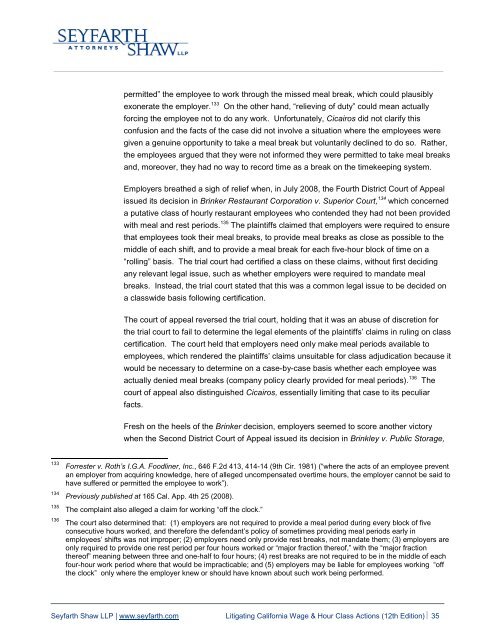Litigating California Wage & Hour and Labor Code Class Actions
Litigating California Wage & Hour and Labor Code Class Actions
Litigating California Wage & Hour and Labor Code Class Actions
Create successful ePaper yourself
Turn your PDF publications into a flip-book with our unique Google optimized e-Paper software.
permitted” the employee to work through the missed meal break, which could plausibly<br />
exonerate the employer. 133 On the other h<strong>and</strong>, “relieving of duty” could mean actually<br />
forcing the employee not to do any work. Unfortunately, Cicairos did not clarify this<br />
confusion <strong>and</strong> the facts of the case did not involve a situation where the employees were<br />
given a genuine opportunity to take a meal break but voluntarily declined to do so. Rather,<br />
the employees argued that they were not informed they were permitted to take meal breaks<br />
<strong>and</strong>, moreover, they had no way to record time as a break on the timekeeping system.<br />
Employers breathed a sigh of relief when, in July 2008, the Fourth District Court of Appeal<br />
issued its decision in Brinker Restaurant Corporation v. Superior Court, 134 which concerned<br />
a putative class of hourly restaurant employees who contended they had not been provided<br />
with meal <strong>and</strong> rest periods. 135 The plaintiffs claimed that employers were required to ensure<br />
that employees took their meal breaks, to provide meal breaks as close as possible to the<br />
middle of each shift, <strong>and</strong> to provide a meal break for each five-hour block of time on a<br />
“rolling” basis. The trial court had certified a class on these claims, without first deciding<br />
any relevant legal issue, such as whether employers were required to m<strong>and</strong>ate meal<br />
breaks. Instead, the trial court stated that this was a common legal issue to be decided on<br />
a classwide basis following certification.<br />
The court of appeal reversed the trial court, holding that it was an abuse of discretion for<br />
the trial court to fail to determine the legal elements of the plaintiffs’ claims in ruling on class<br />
certification. The court held that employers need only make meal periods available to<br />
employees, which rendered the plaintiffs’ claims unsuitable for class adjudication because it<br />
would be necessary to determine on a case-by-case basis whether each employee was<br />
actually denied meal breaks (company policy clearly provided for meal periods). 136 The<br />
court of appeal also distinguished Cicairos, essentially limiting that case to its peculiar<br />
facts.<br />
Fresh on the heels of the Brinker decision, employers seemed to score another victory<br />
when the Second District Court of Appeal issued its decision in Brinkley v. Public Storage,<br />
133<br />
134<br />
135<br />
136<br />
Forrester v. Roth’s I.G.A. Foodliner, Inc., 646 F.2d 413, 414-14 (9th Cir. 1981) (“where the acts of an employee prevent<br />
an employer from acquiring knowledge, here of alleged uncompensated overtime hours, the employer cannot be said to<br />
have suffered or permitted the employee to work”).<br />
Previously published at 165 Cal. App. 4th 25 (2008).<br />
The complaint also alleged a claim for working “off the clock.”<br />
The court also determined that: (1) employers are not required to provide a meal period during every block of five<br />
consecutive hours worked, <strong>and</strong> therefore the defendant’s policy of sometimes providing meal periods early in<br />
employees’ shifts was not improper; (2) employers need only provide rest breaks, not m<strong>and</strong>ate them; (3) employers are<br />
only required to provide one rest period per four hours worked or “major fraction thereof,” with the “major fraction<br />
thereof” meaning between three <strong>and</strong> one-half to four hours; (4) rest breaks are not required to be in the middle of each<br />
four-hour work period where that would be impracticable; <strong>and</strong> (5) employers may be liable for employees working “off<br />
the clock” only where the employer knew or should have known about such work being performed.<br />
Seyfarth Shaw LLP | www.seyfarth.com <strong>Litigating</strong> <strong>California</strong> <strong>Wage</strong> & <strong>Hour</strong> <strong>Class</strong> <strong>Actions</strong> (12th Edition) 35
















